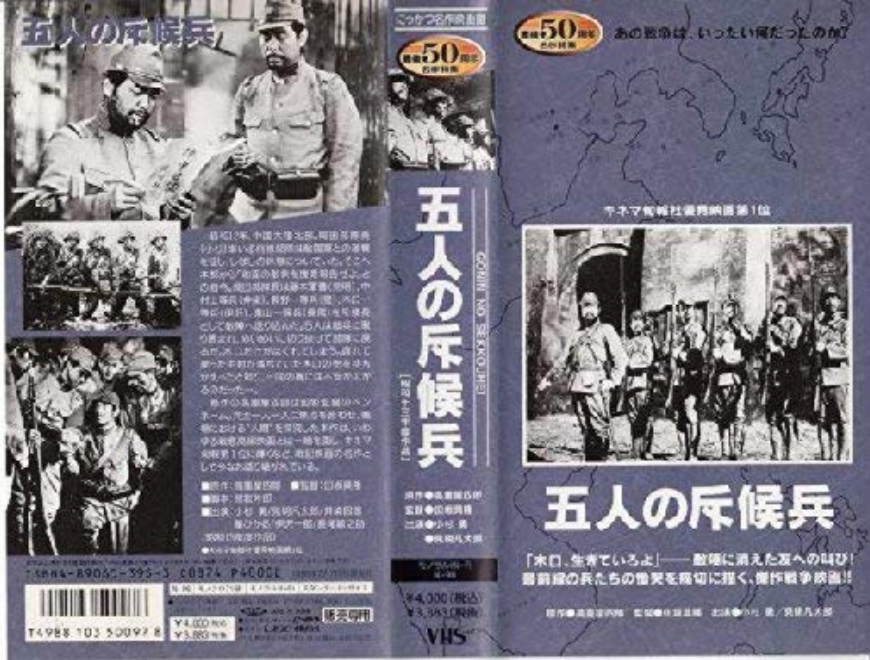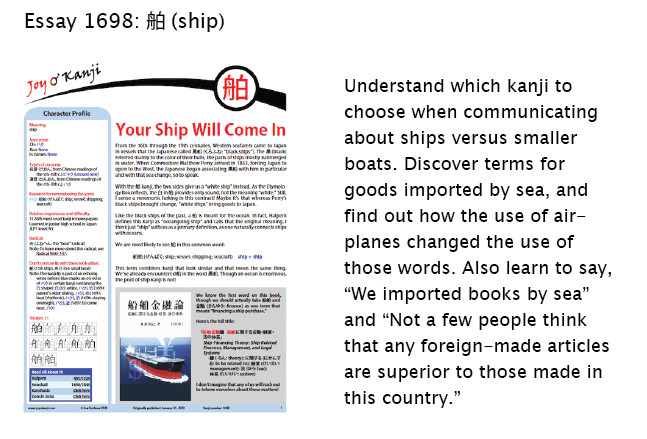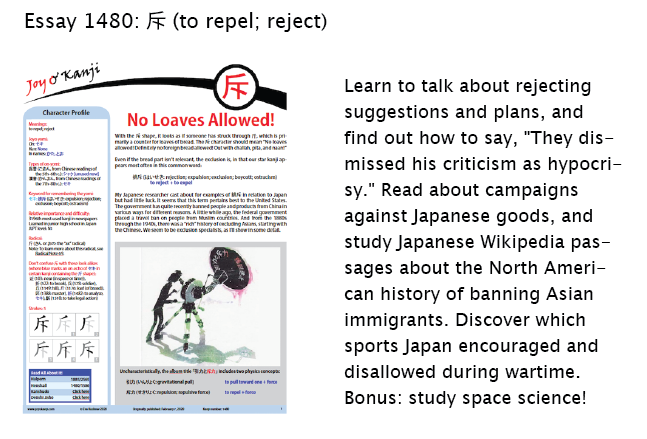Back from the Mountain
Welcome back to the blogosphere here on Joy o' Kanji! It's been nearly two months since I've blogged, mainly because I wanted to make a dent in a mountain of essay revisions. I definitely did, but it remains mountain-sized, so I intend to keep whittling away. In the meantime, I'm eager to share some recent kanji gleanings.
When Was the War?
The newest publication, essay 1480 on 斥 (to repel; reject), includes this VHS cover for a movie:
The title mainly consists of two words:
五人 (ごにん: five people) 5 + person
斥候兵 (せっこうへい: reconnoitering party; individual scout)
scout (1st 2 kanji) + soldier
Thus, the title simply translates as Five Scouts.
My proofreader said in English that the film was about the Sino-Japanese War, which left me wondering which one, as there were two. I found this bare-bones summary on Wikipedia:
• The First Sino-Japanese War (1894–1895) was between China (Qing dynasty) and Japan, primarily over control of Korea.
• The Second Sino-Japanese War (1937–1945) began between China (Republic of China) and Japan in 1937, eventually becoming part of World War II in 1941 when China joined the Allies.
Wow, there's a lot of great information packed into just two sentences!
Anyway, the movie came out in 1938, but as the second war had just begun then, I figured the story had to be about the first one. After all, who would make a movie about World War II in 1940, having no idea how it would end?
I browsed Japanese discussions of the movie here and there, hoping to find clarification, but none came.
Then I discovered that the Japanese refer to the wars with these names:
日清戦争 (にっしんせんそう: First Sino-Japanese War)
日中戦争 (にっちゅうせんそう: Second Sino-Japanese War)
The blue characters, which prevent the Japanese from mixing up the wars, differ as follows:
• 清 (しん) means "Qing dynasty," which lasted donkey's years, from 1636 to 1911.
• 中 (ちゅう) stands for "Republic of China," which was founded in 1912 and which the Japanese more fully refer to as 中華民国 (ちゅうかみんこく).
To complete the picture, the People's Republic of China took its place in 1949 on the mainland. Just as the English name for that country grew longer, so did the Japanese one: 中華人民共和国 (ちゅうかじんみんきょうわこく).
To think—most English speakers just call it China, no matter which era we're discussing!
How to Expand
Shifting gears dramatically, I want to share this great term (with a fun internal rhyme) from the Verbal Logic Quiz of the new essay:
膨張 (ぼうちょう: expansion) to get fat + to lengthen
Something that becomes both wider and longer is expanding. What a great way of representing this concept!
It also reminds me of what my French friend told me on a recent walk as we practiced both languages. She is pregnant, so I asked how to say that. "La grossesse!" she said indignantly, and we both laughed hard because it literally means "the state of being fat." Languages are not always flattering. And do women ever catch a break?!
Sneak Previews
Moving to yet another topic, this one much heavier even than la grossesse, I'm astounded that my two most recent essays correlate so well with the coronavirus news.
Here are sneak previews of the essays in question:
It's more than bizarre that I wrote about ships when right now a cruise ship is sitting in Yokohama Harbor, the passengers quarantined until it becomes clearer whether or not they have contracted the virus.
And how uncanny it is that I wrote about 斥 just as bans were breaking out all over, preventing the Chinese from entering one country after another. Reading essay 1480 in particular may prepare you to comprehend current Japanese news articles more easily.
Catch you back here next time!
❖❖❖
Did you like this post? Express your love by supporting Joy o' Kanji on Patreon:





Comments